Who dat on vacation, day No. 2

Image courtesy of Flickr user Todd Martin by way of a Creative Commons search.https://www.flickr.com/photos/tmartin/
I woke up at 6:45 a.m. to another gray day. Whoever called Florida the “Sunshine State” sold us a bill of good. Wait a minute. We don’t live in Florida. We live in southern Alabama. Roll Tide.
Today was to be a cooking extravaganza. That’s right, the Super Bowl was being played later this afternoon and I had to prepare a feast of New Orleans-themed food, which I had never done before (disaster), while making sure the beer supply never ran low (impossible).
So after lunging out of bed I set about making the house presentable for Ken and Jenny, who might injure themselves tripping over the dead rats in the foyer.
Cleaned up the bathroom, swept all the floors and then got down on my hands and knees and scrubbed the floors until you could actually see the original lineoleum pattern beneath the decades-old crusted-on dirt. I thought about tackling the inside of the microwave but decided it would be better for the planet if I simply threw it away and bought a new one.
Then I had to shower and run some errands. I had no ground turkey or Andouille sausage, both essential to my game menu. While I was out I dropped by Mary and Gene’s to get Brian to sign the bill-of-sale for the Pathfinder and pick up the old license plate. Naturally when I renewed it last October I took the two-year option, then sold it in January. They tell me I can “apply” for a rebate. That doesn’t mean I will “get” a rebate.
Afterwards it was off to Blockbuster where I used my free rental coupon for a Steven Seagal revenge thriller which I have yet to watch. I’m sure it’ll be suitably bloody. Seagal will restrain himself out of respect for civilization, then reach a point of no return and infllict fist-chop armageddon on a villain who kicks puppies and never pays his overdue fees at the library.
Next, Publix, which had 99 percent fat free ground turkey and the right kind of sausage. I also stopped at a Dollar General to buy plastic spoons and a package of bubble-wrap envelopes so I can send my Ultraverse box set to Dave for him to sell on eBay. Those dollar stores are absolutely the best place to find office supplies. I would have spent $3 on the envelopes at Office Max.
I returned home and set about the delicate choreography of “getting everything made.” First up: the chili. I could make it in the crock pot without tying up precious pans, which I needed for the jambalaya and red beans and rice. I browned the turkey, minced black olives, chopped a small portion of pickled banana peppers and threw in the last of the sun-dried tomatoes, along with two cans of tomato sauce, a can of diced tomatoes, a package of chili seasonings and the now-cooked turkey. A dash of vinegar, set the crock pot on 3 and that was that.
Then I had to cook chicken breasts to shred for the jambalaya. I had removed the breasts from the freezer the night before but I think they were still a little frozen inside because after 35 minutes in a 350-degree oven they didn’t look or feel cooked. I ended up baking them another half an hour, by which time they became overcooked and slightly dry. Oh well. They could rehydrate in the jambalaya. At least they were now easy to shred. And Ken and Jenny wouldn’t sue me for salmonella poisoning.
After that I cooked the Andouille. I simmered them in a mixture of water and beer for 10 minutes, per the instructions, then added some of the beer to the chili, which by now was smelling heavenly. I chopped up three of the sausages and set them aside with the chicken for the jambalaya.
It was going on 3:30 so I decided to start the jambalaya, which would take about half an hour to prepare. Ken and Jenny would be over at 5 so I figured I could finish the jamabalaya and put it in a casserole dish on top of a warmer, fluffling it occasionally, while I cooked the red beans and rice.
Cooking this stuff turned out to be insanely easy. Instead of making it from scratch I used Zatarain’s. I love the taste of Zatarain’s but it produces an unpleasant side effect, for me, anyway – it makes me all gassy. I figured I’d take a chance as the Zatarain’s Effect usually kicks in a few hours later thereby sparing Ken and Jenny the awful implications. I wasn’t sure how many people were coming over so I bought two boxes of the “family-size” jambalaya mix, figuring they always underestimate portions as to reduce the calorie count. Well, the folks at Zatarain’s weren’t kidding when they said “family sized.” By the time the jambalaya was done I had a mountain of the stuff. I packed as much as I could into the casserole dish and put it on the heater. The rest I stuck in a Tupperware bowl and put in the fridge.
Meanwhile, Mom dropped by with even MORE food – a batch of chicken wings, two packages of cookies, some kind of weird quiche-pastry hybrid and a gigantic vegetable tray. Oh my. I could have fed the entire population of Cinco Bridge with all the stuff I was making.
Started the red beans and rice. I then deployed the chips and salsa in the gigantic serving bowl I got for Christmas XXXX … I don’t even remember the decade.
Ken and Jenny showed up with more chips and dip, and beer, and we sat down to watch the game. I’d had the TV on since 1 p.m. and tuned to CBS, which was broadcasting non-stop Super Bowl “coverage.” By game time I was so sick of Shannon Sharpe singing “Rain on Me” I could have barfed.
Curiously, as the game got under way I got really, really full and didn’t feel like eating much, which was a shame because the jambalaya was excellent, the red beans and rice not bad, and the chili maybe the best batch I’d ever made. Wow but that stuff was good. I left out all the hot seasonings which allowed the taste of everything else to come through. I don’t think I’ll ever use another dash of hot sauce with chili.
We enjoyed the game and I was happy to see the Saints win, as it was their first Super Bowl and I know a lot of suffering Saints fans. Ken and Jenny took the long drive back to Niceville and I set about cleaning up the kitchen.
My fridge is now packed with a week’s supply of food. I’ve got mountains of cookies and pastries. The house still smells like jambalaya.
Oh, and the Zatarain’s Effect kicked in late in the night.
But a great Day No. 2 of vacation!
About the author:
Del Stone Jr. is a professional fiction writer. He is known primarily for his work in the contemporary dark fiction field, but has also published science fiction and contemporary fantasy. Stone’s stories, poetry and scripts have appeared in publications such as Amazing Stories, Eldritch Tales, and Bantam-Spectra’s Full Spectrum. His short fiction has been published in The Year’s Best Horror Stories XXII; Alfred Hitchcock’s Mystery Magazine; the Pocket Books anthology More Phobias; the Barnes & Noble anthologies 100 Wicked Little Witch Stories, Horrors! 365 Scary Stories, and 100 Astounding Little Alien Stories; the HWA anthology Psychos; and other short fiction venues, like Blood Muse, Live Without a Net, Zombiesque and Sex Macabre. Stone’s comic book debut was in the Clive Barker series of books, Hellraiser, published by Marvel/Epic and reprinted in The Best of Hellraiser anthology. He has also published stories in Penthouse Comix, and worked with artist Dave Dorman on many projects, including the illustrated novella “Roadkill,” a short story for the Andrew Vachss anthology Underground from Dark Horse, an ashcan titled “December” for Hero Illustrated, and several of Dorman’s Wasted Lands novellas and comics, such as Rail from Image and “The Uninvited.” Stone’s novel, Dead Heat, won the 1996 International Horror Guild’s award for best first novel and was a runner-up for the Bram Stoker Award. Stone has also been a finalist for the IHG award for short fiction, the British Fantasy Award for best novella, and a semifinalist for the Nebula and Writers of the Future awards. His stories have appeared in anthologies that have won the Bram Stoker Award and the World Fantasy Award. Two of his works were optioned for film, the novella “Black Tide” and short story “Crisis Line.”
Stone recently retired after a 41-year career in journalism. He won numerous awards for his work, and in 1986 was named Florida’s best columnist in his circulation division by the Florida Society of Newspaper Editors. In 2001 he received an honorable mention from the National Lesbian and Gay Journalists Association for his essay “When Freedom of Speech Ends” and in 2003 he was voted Best of the Best in the category of columnists by Emerald Coast Magazine. He participated in book signings and awareness campaigns, and was a guest on local television and radio programs.
As an addendum, Stone is single, kills tomatoes and morning glories with ruthless efficiency, once tied the stem of a cocktail cherry in a knot with his tongue, and carries a permanent scar on his chest after having been shot with a paintball gun. He’s in his 60s as of this writing but doesn’t look a day over 94.
Contact Del at [email protected]. He is also on Facebook, twitter, Pinterest, tumblr, TikTok, and Instagram. Visit his website at delstonejr.com .

The newly resurfaced tennis courts at Ferry Park don't offer much in the way of tripping hazards. Image courtesy of Del Stone Jr.
My vacations come and go so quickly I wonder where they went. THIS vacation I vow to keep track of every precious second. Hence, this “vacation diary.”
Sooo … how did Day 1 of Vacationland go?
Well, I charged out of bed at 6:30 and made a pot of coffee, knowing that nine full days between me and work awaited. What a glorious feeling. I stripped the bed of sheets and tossed them into the Basket of Moldering Death to be washed. Then I (TMI – personal) and (TMI – personal). I emptied the Basket of Moldering Death and dumped the contents into the washing machine, which almost blew a gasket due to the heavy load.
Then it was time to shower for my tennis session with Dusty. I refused to shave. Dammit, Jim, I’m on vacation. I got dressed for said tennis excursion and took the clothes out of the washer, throwing them into the dryer. I turned it on for a short time but realized I’d need to leave before they were done, so I turned off the dryer having witnessed a house on Newcastle Drive burn to the ground due to a faulty dryer switch.
I drove to Winn-Dixie in Uptown Station to drop off my plastic bags for recycling. I gazed inside. Oh my. A certain somebody was working that morning but I resisted the urge to do something stupid. I drove to the recycling van on Robinwood Drive to empty my three plastic containers and 10,000 beer bottles. A colony of wasps has taken over the recycling van. I think they’re alcoholics, because they like the glass bin and become very, VERY angry when you toss Redhook empties into the bin.
After fighting off strafing attacks from drunken wasps I drove to Ferry Park, where Dusty and I smacked the ball around. I had to mop water from the court but it dried – sort of – and besides, Dusty was playing on that side of the court so it was his broken leg, not mine. Then we hit with Stan and Jet, and we BEAT them 6-4. My net play was this side of awful. I was afraid Stan’s line drives would smack me in the nose. I got an absolutely FABULOUS blister on my masturbation hand and had to retire after one set.
I went home, changed clothes and drove to Mom’s so I could attack the yard. Now I know why Dad wanted to cut down every tree in that yard. It’s a LEAFPOCALYPSE. I better not see any squirrels within 50 yards of the birdfeeder because there were enough acorns on the ground to feed the entire Northern Hemisphere’s population of squirrels. I raked and hauled leaves the rest of the morning, chatted with Mom awhile, tried to solve the mystery of her non-functioning doorbell, then drove home with a load of biscuits and gravy.
Then it was a quick shower and a short road trip. I deposited the money Brian gave me for the Pathfinder (yes, the Pathfinder is sold … sob), then dropped by Blockbusters to rent “The Hangover.” Then I fought traffic from Blockbuster to Walmart. The parking lot at Walmart was a zoo of mouthbreathers. I don’t know why but once people enter the parking lot at Walmart their IQs drop about 70 bazillion points. The guy ahead of me driving a gi-normous el heffe penismobile truck crept along at -2 mph. I would have laid on the horn but he probably would have gotten out, beaten me to a pulp and then peed on me. I got so angry I left Walmart and went back to Winn-Dixie in Uptown Station. That place was a zoo too but at least it was a smaller zoo.
I loaded up on groceries for tomorrow. In honor of the Aints I am making red beans and rice, jambalaya (with shredded chicken and turkey sausage), and chili. I also got some chips to use up the 20,000 bottles of salsa I have scattered around the house. Oh and beer of course.
When I got back I chatted with Donny for a minute (he’s putting in wood floors next door) then cracked open a Redhook ESB to celebrate the gray, freezing afternoon of Day 1 of my vacation.
When I finish this ridiculous epistle I will go downstairs, eat the biscuits and gravy, watch “The Hangover” and probably fall asleep on the couch with ropes of drool hanging from my mouth.
I’d say it was a pretty successful first day of vacation.
About the author:
Del Stone Jr. is a professional fiction writer. He is known primarily for his work in the contemporary dark fiction field, but has also published science fiction and contemporary fantasy. Stone’s stories, poetry and scripts have appeared in publications such as Amazing Stories, Eldritch Tales, and Bantam-Spectra’s Full Spectrum. His short fiction has been published in The Year’s Best Horror Stories XXII; Alfred Hitchcock’s Mystery Magazine; the Pocket Books anthology More Phobias; the Barnes & Noble anthologies 100 Wicked Little Witch Stories, Horrors! 365 Scary Stories, and 100 Astounding Little Alien Stories; the HWA anthology Psychos; and other short fiction venues, like Blood Muse, Live Without a Net, Zombiesque and Sex Macabre. Stone’s comic book debut was in the Clive Barker series of books, Hellraiser, published by Marvel/Epic and reprinted in The Best of Hellraiser anthology. He has also published stories in Penthouse Comix, and worked with artist Dave Dorman on many projects, including the illustrated novella “Roadkill,” a short story for the Andrew Vachss anthology Underground from Dark Horse, an ashcan titled “December” for Hero Illustrated, and several of Dorman’s Wasted Lands novellas and comics, such as Rail from Image and “The Uninvited.” Stone’s novel, Dead Heat, won the 1996 International Horror Guild’s award for best first novel and was a runner-up for the Bram Stoker Award. Stone has also been a finalist for the IHG award for short fiction, the British Fantasy Award for best novella, and a semifinalist for the Nebula and Writers of the Future awards. His stories have appeared in anthologies that have won the Bram Stoker Award and the World Fantasy Award. Two of his works were optioned for film, the novella “Black Tide” and short story “Crisis Line.”
Stone recently retired after a 41-year career in journalism. He won numerous awards for his work, and in 1986 was named Florida’s best columnist in his circulation division by the Florida Society of Newspaper Editors. In 2001 he received an honorable mention from the National Lesbian and Gay Journalists Association for his essay “When Freedom of Speech Ends” and in 2003 he was voted Best of the Best in the category of columnists by Emerald Coast Magazine. He participated in book signings and awareness campaigns, and was a guest on local television and radio programs.
As an addendum, Stone is single, kills tomatoes and morning glories with ruthless efficiency, once tied the stem of a cocktail cherry in a knot with his tongue, and carries a permanent scar on his chest after having been shot with a paintball gun. He’s in his 60s as of this writing but doesn’t look a day over 94.
Contact Del at [email protected]. He is also on Facebook, twitter, Pinterest, tumblr, TikTok, and Instagram. Visit his website at delstonejr.com .
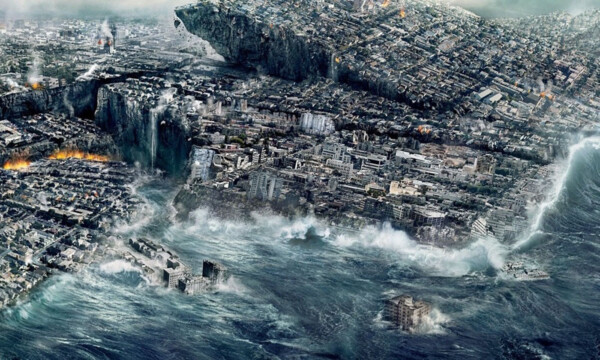
Image courtesy of Columbia Pictures.
—
“2012” Starring John Cusack, Amanda Peet, Oliver Platt, Woody Harrelson and Danny Glover. Directed by Roland Emmerich. 158 minutes. Rated PG-13.
Mladen’s take
The film “2012,” now on DVD and Blu-ray disc, is a man-made disaster about a natural catastrophe.
“My gosh,” I said to myself about halfway through the longer than 2 1/2 hour movie, “can’t the world come to an end quicker?”
In “2012,” landmasses shift cataclysmically because mutant neutrinos from a solar flare superheat the Earth’s core. The Himalayas become the ocean’s flood plain. California becomes a part of the seafloor.
The upheaval results in hundreds of millions of deaths, unless you’re an Arab royal or Russian mobster who can afford to drop $1 billion euros per person for luxurious passage on secretly built “arks,” or happen to be a member of the Curtis family et al.
Ineptly, yet decisively, led by Jackson Curtis, as portrayed by John Cusack, the family ceaselessly eludes death by blunt trauma or scorching again and again and again and again.
The earth uplifts beneath their car, they escape.
Bridges collapse, they dodge.
The ground tears open at their feet, they scurry.
California explodes, they find an airplane to maneuver around toppling skyscrapers like a mosquito flying between raindrops.
A pyroclastic flow – ash spewing, acid sizzling, boulders flaming – comes gushing their way, but they outrun it.
Finally, don’t ask how, the Curtises reach the Himalayas, trudging through snow in search of the arks.
Just as they’re about to give up hope for the tenth time of surviving, along comes a Buddhist monk driving a pickup truck along a winding trail. He gives the Curtises a lift to a back entrance of the cavernous mountaintop shipyard where the monk’s brother, who helped build the arks, smuggles the whole lot aboard Ark 4, which belongs to America. What luck, eh?
The Curtises live and “2012” ends with three arks steaming for Africa, which apparently survived the churning core. Get it? Humans got their evolutionary start in Africa and now they’re returning to Africa for another beginning. “2012” teems with such philosophic wonderment and profound irony.
That the ships were called Arks, by the way, was the final straw for me.
I’m tired of sectarian references, in this case, ark as in Noah’s Ark, constantly appearing in catastrophe movies.
Why did “2012” director Roland Emmerich have to label the vessels that saved a small portion of corrupt, self-serving mankind, arks, as though the endeavor was noble?
It would have been more accurate to label the arks “survival ships for the filthy rich and slimy politicians.”
Or, the arks could have been called, “keep-the-privileged-alive semi-submersibles,” mimicking the DEA description of vessels drug traffickers use to move product along the coastlines of Central and South America.
Rent, do not buy, “2012” only if you have a potent surround sound system. The movie’s sound effects are its only merit.
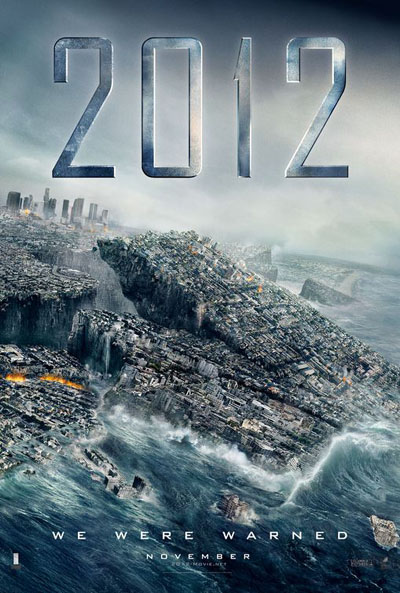
Del’s take
Director Roland Emmerich blew up the White House in “Independence Day.” He knocked over the Statue of Liberty in “The Day After Tomorrow.” In “2012” he inundates, melts down and otherwise reduces to soggy molecules the entire world in an orgy of destruction that will leave you wondering what you did for entertainment before CGI made it possible to watch a tidal wave overwash the Himalayas.
If there is such a thing as “disaster porn,” “2012” is triple-X.
The storyline is simple: A freak burst of neutrinos from the sun is causing the earth’s core to heat up, resulting in an extinction-level event (to borrow a term from “Deep Impact”). Volcanoes the size of Wyoming will destroy vast swaths of countryside while earthquakes and tsunamis finish off what the volcanoes fail to vaporize.
The lead viewpoint character is John Cusack, a could-have-been writer who operates a limo service to pay the rent. He lives in a dump, oversleeps appointments and consistently lets down his ex-wife, Amanda Peet, and his two children. Peet has moved on to a new husband, a man with a solid job who provides her and the kids with a great house and lots of fun gadgets – not to mention contempt for Cusack’s fumbling inadequacies as a father and a man.
See where this is going?
Meanwhile strange events are unfolding around the world. Earthquakes open cracks along fault lines in California. Lakes boil away in Yellowstone Park. The church channel lady with the pink cotton candy hair shaves her head and gets a nose bob … OK, maybe that’s a little too weird but you get the picture.
What follows is a hair-raising series of improbable cliffhangers resulting in … well, let’s just say if you’re familiar with the Roland Emmerich formula you’ll not be disappointed.
“2012” is silly and stupid, but it’s also a lot of fun.
The science is non-existent. Take those pesky neutrinos. Neutrinos have no mass, which means they pass right through you and me, the buildings we inhabit, and the earth itself. How can something that has no mass heat the earth’s core?
In the movie we see a huge Russian transport airplane, an Antonov 225, perform a 60-degree power climb. Ain’t happening folks, not even with a crazy Russian hotdog of a pilot.
And “2012” seems to forget all about the nuclear winter hypothesis, which predicts that if you inject enough soot and dust into the atmosphere, the sun isn’t going to shine for months if not years.
I’m curious. Why do these disaster movies never take into account the hundreds of wrecked nuclear reactors around the world? All that plutonium has got to go somewhere.
And why does every disaster movie center around a divorced dad trying to win back the love of his children, if not his ex-wife? John Cusack’s role seems lifted directly from Steven Spielberg’s “The War of the Worlds” Tom Cruise character. Or “Independence Day.” Or even “The Day the Earth Stood Still.”
I guess we’re supposed to ignore those logic flaws as we watch an aircraft carrier of a surfboard take out the White House, or the San Andreas fault submerge the entire West Coast into the Pacific.
I can do that for two hours.
When “2012” debuted on DVD it blew away the competition. I had to ask the folks at the local Blockbuster if they had a copy behind the counter because the shelves were empty. As I waited, two more customers asked for it. (Speaking of which, don’t you hate the demise of the local DVD rental store? Netflix, Red Box and streaming are lousy substitutes for wandering the aisles as you check out the dust jackets on a DVD case.)
I give “2012” 3½ out of five stars, subtracting points for bad science and hackneyed storytelling, but awarding points for special effects and entertainment value.
Your $5 rental fee won’t have been wasted.
Mladen Rudman is a former journalist and technical editor. Del Stone Jr. is a former journalist and author.

Image courtesy of Summit Entertainment.
—
“The Hurt Locker” Starring Jeremy Renner, Anthony Mackie, Brian Geraghty. directed by Kathryn Bigelow. 131 minutes. Rated R.
Mladen’s take
It hurt me a couple of weeks ago when “The Hurt Locker” won the best picture Oscar. That’s two of the past three years that the wrong film took the most important Academy Award.
Director Kathryn Bigelow has created, at best, a mediocre product. “The Hurt Locker” lacks emotion. Its tension is contrived because it results from poor choices by the movie’s leading character.
The film also lacks charisma despite Bigelow mimicking the formula used by Oliver Stone in “Platoon,” which did deserve the best picture Oscar for its depiction of the Vietnam war.
“The Hurt Locker” follows a three-man Army explosive ordnance disposal team through the dusty, brown streets of some Iraqi city.
Jeremy Renner, as William James, plays the role of the reckless, uncompromising staff sergeant commanding the EOD unit. Second-in-charge Sgt. J.T. Sanborn, portrayed by Anthony Mackie, is sensible and risk-aversive.
Sanborn prefers sending robots to defuse IEDs. James, on the other extreme, enjoys tinkering face-to-face with a trunk full of 152-mm rounds wired to blow.
Caught between the two stereotypical soldiers is the trio’s third man, Brian Geraghty, playing Specialist Owen Eldridge.
Eldridge, uncomfortable with the idea of killing and jittery in combat, is the equivalent of Charlie Sheen’s character in “Platoon.” James and Sanborn are hybrids of the two squad leaders in “Platoon” played by Tom Berenger and Willem Dafoe.
Berenger, Dafoe, and Sheen, in that order, made “Platoon” a potent movie very effectively summarizing the absurdity of a war that also was domestically unpopular.
In “The Hurt Locker,” all Bigelow managed to do was create unlikable characters who failed to provoke sympathy. To me, it would have matter almost nothing if James, Sanborn, or Eldridge died, though it was the fault of an inept presidency and rubber-stamp Congress that they were fighting in Iraq.
The movie’s most bitter disappointment happens about halfway through its 131 minutes.
While trying to help mercenaries change a flat tire, the trio unexpectedly finds itself in a sniper’s duel. James and Sanford, though trained as bomb disposers, are stunningly capable as a shooter and spotter, respectively.
They calmly, coolly, expertly, take up prone positions behind a .50-caliber sniper rifle to start searching for targets.
At one point, Sanford, deftly coached by James, nails an insurgent with a headshot at 850 yards (2,550 feet) through a desert haze. Oh, the insurgent was running across Sanford’s field of view when he took the 1-ounce slug. Oh, moments earlier, Sanford had missed the very same insurgent while he was lying on the ground and not moving.
“The Hurt Locker” offers nothing that hasn’t been provided by other war movies. And, it sheds no fresh or thought-provoking perspective on the Iraq war or its affect on American soldiers.
I want a recount. “District 9” must have been the real winner of the Oscar for best picture.

Del’s take
I take it from Mladen’s review “The Hurt Locker” was an OK movie that didn’t deserve a best picture Oscar.
No arguments there. Well … a few.
I liked the movie better than Mladen but agree it was flawed. The quibbles include fakey explosions that never seem to match the ferocity of IED blasts depicted in actual footage, and fakey combat scenarios that allow a guy with a sniper rifle to pick off a running man at a thousand yards. I can’t suspend my disbelief.
I thought the movie’s biggest weakness, however, lay in its structure. The viewpoint character, played by Renner, craves the adrenaline cocktail of ordnance disposal and the risk of death his job presents. We see a brief glimpse of his other life back home – he’s confounded and ultimately bored by the cereal selections at a supermarket – and discover he’s a bonafide war addict. To appreciate the yin and the yang of his lust we must experience both sides equally, yet nine-tenths of “The Hurt Locker” takes place in Iraq, depriving the audience of any feel for the character and his conflicts.
Still, “The Hurt Locker” is a good movie, and Renner absolutely deserved the Oscar nomination he received for best actor.
But was “The Hurt Locker” the best movie of 2009?
No, no and no.
Instead of re-treading ground already covered by Mladen I’d like to talk about the possible machinations that led to “The Hurt Locker’s” ordination as best picture.
Machination No. 1: the award.
For a creator, winning an award is money in the bank. You win an award and people who haven’t seen your product want to see it. They rent it, they buy it, and sometimes they steal it. But to win that award you must do something we writers call “campaigning.” You woo the support of those who nominate your product, trade favors, advertise, and send out e-mails – which notoriously backfired with “The Hurt Locker.”
I did this as a writer in the late 1990s and early 2000s.
Campaigning is an ugly mess, one of the reasons I dropped my memberships with groups like the Science Fiction Writers of America and the Horror Writers Association. It made me feel dishonest. After all, shouldn’t the best product win?
That’s the theory, but in reality the product most effectively campaigned often wins.
Machination No. 2: politics.
Groups that hand out awards, like the Academy of Motion Picture Arts and Sciences, keep a close eye on political expediency. They want to be seen as forward-thinking and progressive, and at the same time they want to reward fealty to their artistic vision … with a wee eye kept on the bottom line. How else to explain John Wayne’s Oscar score for “True Grit”?
When rumblings were heard that no woman had won an Academy Award for best director, and that maybe the Academy wasn’t as forward-thinking as it wanted to be known, along comes Kathryn Bigelow with “The Hurt Locker.” Coincidence? I think not.
Which leads me to Machination No. 3: the snub.
No individual can be bigger than the machinery supporting that individual … unless you’re George Lucas, Steven Spielberg, or James Cameron. But even those pillars of the moviemaking community must have their noses tweaked ever so often just to let them know who’s boss.
Cameron has produced the two biggest movie blockbusters of the past 11 years – “Avatar” and “Titanic.” In 1998 Cameron declared himself “king of the world” during his Oscar acceptance speech for best director of “Titanic.”
Word on Hollywood Boulevard is that Cameron is an ass to work for. He’s egocentric, abusive and dismissive of the Tinsel Town Machine, qualities that might endear him to ordinary Americans but would not play well with the rarefied and elitist company of Hollywood movers and shakers. What better way to bring Cameron down a notch than to give the best director award to his former wife, Kathryn Bigelow, who directed a movie at a tiny fraction of Cameron’s “Avatar” budget?
Obviously I can’t know what really happened. But having played the game for so many years I suspect merit had little to do with the outcome. A combination of politics, ego-mashing and campaigning resulted in “The Hurt Locker” being named the best picture of 2009.
There might be a fourth reason – plain old disdain for that which is popular. The publishing industry is particularly notorious for supporting obscure, obtuse products over those which pay the bills. John Grisham won’t win a Pulitzer Prize but he allows the college professor who does a fighting chance to claim a mainstream audience.
My definition of “best movie” consists of a simple rubric: the film that sold the most tickets. “The Hurt Locker” didn’t do that and frankly I don’t trust the judgment of those who say it was better than its box-office performance.
By all means rent “The Hurt Locker.” But don’t expect any epiphanies. On a five-star scale it rates a 3½ – not a waste of your money but certainly not best picture of 2009.
Mladen Rudman is a former journalist and technical editor. Del Stone Jr. is a former journalist and author.

Image courtesy of Patryk Dziejma, StockSnapIO. Creative Commons license.
I never worry about going to the dentist or the eye doctor because we always have such fun! One of the advantages of living in a small town I guess.
My dentist is Dr. David Hanle, who is just excellent. After Chris is finished scraping the nicotine and caffeine off my teeth Dr. Hanle comes in to look for cavities. I have had a number of teeth break over the past few years, thanks to my habit of chewing ice in my youth, and he always rebuilds them. I can honestly say I have never felt pain during any of his procedures.
We talk about all kinds of stuff. They’re great at carrying one-sided conversations, as my mouth is usually stuffed with appliances, tubes, etc. They’re very good at interpreting my grunts. Chris is a championship dog trainer and enters her spaniel in shows all over the South. Dr. Hanle has a passel of kids and is very active in his church and the community. Together they’re two really great people and it’s my honor to know them.
Then there’s Dr. George Edlund at 20/20 Eye Care. I’ve been seeing him now for a decade and I always look forward to my appointments because we spend an obscene amount of time chatting, cracking jokes and otherwise goofing around. Today was no exception.
I was a little concerned about today because I’d been having some vision problems. Nothing serious, or so I hoped. When I’d stare at a computer screen for awhile I’d see dark filaments crossing my vision. I blogged about this once and the comment-leavers said I had high blood pressure or diabetes. Dr. Edlund eased my fears by pointing out the comment-leavers probably got their medical degrees online too.
He said I was probably seeing “floaters,” which occur as the vitreum in the eye begins to fractionate. It can sometimes pick up debris from the eyewall which becomes entrained in the matrix. This debris sometimes crosses your field of vision and manifests as a glowing blob, a tiny dot or a thready filament. In fact, the Latin name for “floaters” translates into “swarming gnats.”
But he did all the tests. He poured everything under the kitchen sink into my eyes.
My worst fear was the dreaded macular degeneration. I have a genetic predisposition to that awful disease. My dad and his sister had it, and my mom’s brother had it. My older sister has just been diagnosed with it. The blood supply from the back of the eye becomes impaired, which causes a person to lose his central vision. He can still see peripherally but not if he looks straight ahead. That would definitely cramp my reading, writing and web-surfing style.
Dr. Edlund pronounced me problem-free of any eye disorders. Even better, my prescription had hardly changed from almost four years ago!
At about 4:15 I was done. My eyes had been dilated so I could barely see to drive, much less read, so instead of going back to work I went home. In a week I’ll have new glasses, and the cost was only half the amount of the previous glasses!
About the author:
Del Stone Jr. is a professional fiction writer. He is known primarily for his work in the contemporary dark fiction field, but has also published science fiction and contemporary fantasy. Stone’s stories, poetry and scripts have appeared in publications such as Amazing Stories, Eldritch Tales, and Bantam-Spectra’s Full Spectrum. His short fiction has been published in The Year’s Best Horror Stories XXII; Alfred Hitchcock’s Mystery Magazine; the Pocket Books anthology More Phobias; the Barnes & Noble anthologies 100 Wicked Little Witch Stories, Horrors! 365 Scary Stories, and 100 Astounding Little Alien Stories; the HWA anthology Psychos; and other short fiction venues, like Blood Muse, Live Without a Net, Zombiesque and Sex Macabre. Stone’s comic book debut was in the Clive Barker series of books, Hellraiser, published by Marvel/Epic and reprinted in The Best of Hellraiser anthology. He has also published stories in Penthouse Comix, and worked with artist Dave Dorman on many projects, including the illustrated novella “Roadkill,” a short story for the Andrew Vachss anthology Underground from Dark Horse, an ashcan titled “December” for Hero Illustrated, and several of Dorman’s Wasted Lands novellas and comics, such as Rail from Image and “The Uninvited.” Stone’s novel, Dead Heat, won the 1996 International Horror Guild’s award for best first novel and was a runner-up for the Bram Stoker Award. Stone has also been a finalist for the IHG award for short fiction, the British Fantasy Award for best novella, and a semifinalist for the Nebula and Writers of the Future awards. His stories have appeared in anthologies that have won the Bram Stoker Award and the World Fantasy Award. Two of his works were optioned for film, the novella “Black Tide” and short story “Crisis Line.”
Stone recently retired after a 41-year career in journalism. He won numerous awards for his work, and in 1986 was named Florida’s best columnist in his circulation division by the Florida Society of Newspaper Editors. In 2001 he received an honorable mention from the National Lesbian and Gay Journalists Association for his essay “When Freedom of Speech Ends” and in 2003 he was voted Best of the Best in the category of columnists by Emerald Coast Magazine. He participated in book signings and awareness campaigns, and was a guest on local television and radio programs.
As an addendum, Stone is single, kills tomatoes and morning glories with ruthless efficiency, once tied the stem of a cocktail cherry in a knot with his tongue, and carries a permanent scar on his chest after having been shot with a paintball gun. He’s in his 60s as of this writing but doesn’t look a day over 94.
Contact Del at [email protected]. He is also on Facebook, twitter, Pinterest, tumblr, TikTok, Ello and Instagram. Visit his website at delstonejr.com .

Image courtesy of Warner Brothers.
—
“Terminator Salvation” Starring Christian Bale, Sam Worthington, Anton Yelchin, Moon Bloodgood. Directed by McG. 114 minutes. Rated PG-13.
Mladen’s take
Take a little “Total Recall,” mix it with “Transformers,” sprinkle a tablespoon of “Mad Max,” bake at 350 degrees computer-generated special effects, and, voila, the result is “Terminator Salvation.”
“Salvation” is unable to compete with any of its three predecessors but it ain’t a bad film. One weakness is its PG-13 rating. There are plenty of explosions, but no close ups of bullets or shrapnel shredding bodies, or robo-hands tearing off heads.
The principal difference between “Salvation” and the other Terminator movies is that John Connor, humanity’s salvation, is now an adult and Kyle Reese, Connor’s father, is a child. Nevermind, it’s not worth explaining.
In the first three movies, the objective is to keep Connor alive. In the fourth, it’s making sure Reese avoids ingesting 40 7.67-mm rounds per second from a minigun.
Christian Bale, as Connor, plays what has now become a potentially career-ending typecast for him, a brooding, mopey hero.
The most interesting character in “Salvation” is the machine army’s first T-800 cybrid assassinator, which is unaware of its origin or allegiance. Sam Worthington portrays the cybrid, known as Marcus Wright.
Once you overlook the murkily explained way Wright becomes the next-generation terminator, his portrayal of a sentient machine enduring an identity crisis is fairly convincing.
Add to Worthington’s character the lovely and very human sidekick, A-10 pilot Blair Williams, and “Salvation” becomes more than palatable. Williams is played by Moon Bloodgood, a beautiful woman with the sexiest voice on the planet.
Typical of Armageddon-like movies, the post-apocalypse Earth in “Salvation” is drab browns, dark blues and assorted grays. Only flashing red lights and the orange of explosions adds color to the film.
It takes some suspension of contextual logic to consider mankind’s resistance against the encroaching world of a computer constellation with artificial intelligence plausible.
For example, if Skynet, the Vladimir Putin of the machinekind in “Salvation,” is so smart, lethal, and efficient, why did it fail to nuke all of America’s military bases and repair depots? I ask because the humans in the film have access to a broad range of weapons. From MV-22s to a nuclear-powered attack submarine, Connor and his troops avoid the uncomfortable position of fighting robots with clubs and rocks.
“Salvation” gets three stars out of five, if for no other reason than its respectful bow toward the end to the greatest terminator of all, the now politically besieged governor of California.
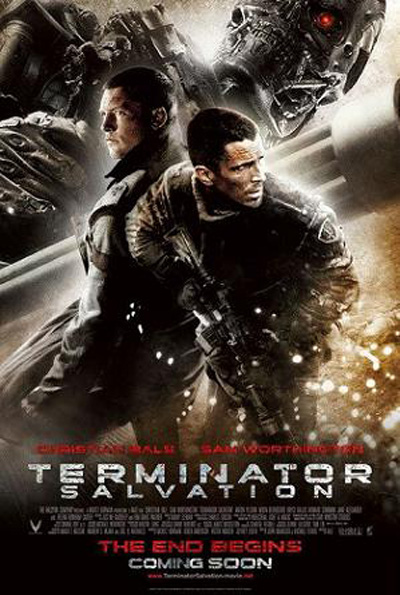
Del’s take
Let’s see if I can nail down the premise of “Terminator Salvage Operation”: John Connor must jack into the Matrix where his mentor Obi Wan has been captured by an alien face-hugger. There he meets Gandolf, who wields a mean club when the Road Warrior attacks, but they escape with the aid of Mr. Spock who is undergoing the colon-cleansing ritual of pon-fart.
I swear. There were times during “Terminator Salvation” when I thought I was watching “The Road Warrior,” “Transformers” and maybe just a wee bit of “Star Trek,” “Alien” and “Lord of the Rings.”
These science fiction franchises have become about as interesting and fun as a civil service employment application. They’re way too complicated and take themselves way too seriously, and their creators seem to have forgotten that story will always trump effects.
Worse, they’re all borrowing stuff from each other, sort of like a taco pizza cheeseburger.
Here’s the rundown on “Salvation”: It occurs after “Judgment Day,” the day a vast computer system called Skynet becomes self-aware and decides to pan-roast humanity with the nuclear bombs it has been put in charge of (and this date conveniently shifts from movie to movie. In the original “Terminator” it was Aug. 29, 1997. In “Terminator 2: Judgment Day” it’s July 25, 2004, presumably because of meddling in the timeline. In the TV show “Terminator: The Sarah Connor Chronicles” it’s moved to April 2011 … can’t they just settle on a date and be done with it?).
After pushing the button Skynet decides to rid the world of pesky human survivors by building a global network of machines that work 24/7 to hunt down human beings and kill them. Humanity, deprived of its Netflix popups and angry because of it, retaliates by organizing resistance fighters who live underground, eat rats, and have access to phase plasma rifles in the 40-watt range (an homage … get it?).
John Connor, the anointed savior of mankind, must make sure his dad, the teenaged Kyle Reese, lives long enough to go back in time and impregnate his mother, Sarah Connor. Meanwhile the first human-like Terminator awakens and thinks he is human, never believing he might have been programmed to do what he spends most of the movie doing. Amazingly he bumps into Reese, one of two survivors living in Los Angeles, and then the movie becomes one big fist punching, guns blazing, jets screaming, atomic-bomb exploding craptravaganza.
I was wrong. This isn’t a civil service employment application; it’s Donald Trump’s tax return.
Christian Bale becomes tiresome as the eternally brooding, always angry John Connor. I keep remembering that insane tirade (warning: extremely foul language) by Bale posted on the Internet where he threatened to beat the &@$% out of the director of lighting for interrupting his shot. Moon Bloodgood irritates me because her name is so obviously contrived. And how did Anton Yelchin (“Star Trek”) score two of the biggest movies of the summer season?
One bright note is Sam Worthington as the Terminator who doesn’t know he’s a Terminator. Oops! Spoiler? No problema, baby. It’s telegraphed in the first five minutes.
I have two regrets about “Terminator Salvation.”
No. 1: There was no “Battlestar Galactica” tie-in.
No. 2: I spent $7 seeing this in the theater when I could have waited for it to show up in the $5 bin at Walmart.
From what I hear there’s a T5 in the making.
I guess the Terminator will be back.
Mladen Rudman is a former journalist and technical editor. Del Stone Jr. is a former journalist and author.
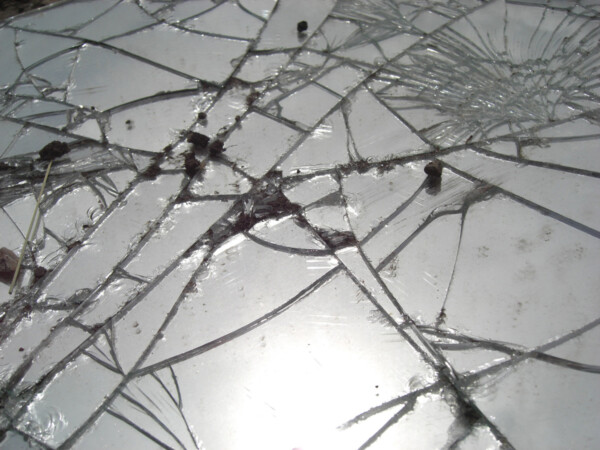
Image courtesy of Flickr user Tim Sheerman-Chase by way of a Creative Commons license. https://www.flickr.com/photos/tim_uk/
So.
The guys came over to refurbish the exterior of our units at the townhouse complex. In the process they caused a lot of destruction, namely:
1. They destroyed my potted plant, Methuselah, that had been with me since 1996.
2. They hammered around the sliding glass door so hard the plaster inside the frame cracked and fell off.
3. Knocked the shelf off the wall in the laundry room.
4. Destroyed the dryer vent.
5. Tore a rip in the sliding screen door upstairs.
6. Punched a nail through the wall of my upstairs bedroom.
7. Broke the globe around my downstairs front-door porch light.
Now I come to find they’ve done more:
1. Cracked the wall by my front door.
2. Destroyed the wind chimes I had hanging off the patio.
3. Damaged the electrical connection to my AC so that it no longer works.
Then, I go out with Matt for wings and the next day I’m suffering from a mild case of food poisoning.
TODAY, I go over to Mom’s to figure out who stole her ladder (turns out it wasn’t stolen) and why her car AC comes on by itself (turns out it’s set to come on when she uses the defroster) and see antifreeze gushing out of my SUV. This would be the same SUV I recently had overhauled to the tune of $1,800.
I know this isn’t just a coincidence. I know during the process of doing all the work they did something happened to cause this hose to leak. Problem is, how do I prove it?
Because I know they will say, “It’s a cracked hose and the repair bill is $300.”
I DID ask them to inspect the hoses, and that may be my saving grace.
But I wish things would settle down for a week or so.
I’m really tired of drama.
About the author:
Del Stone Jr. is a professional fiction writer. He is known primarily for his work in the contemporary dark fiction field, but has also published science fiction and contemporary fantasy. Stone’s stories, poetry and scripts have appeared in publications such as Amazing Stories, Eldritch Tales, and Bantam-Spectra’s Full Spectrum. His short fiction has been published in The Year’s Best Horror Stories XXII; Alfred Hitchcock’s Mystery Magazine; the Pocket Books anthology More Phobias; the Barnes & Noble anthologies 100 Wicked Little Witch Stories, Horrors! 365 Scary Stories, and 100 Astounding Little Alien Stories; the HWA anthology Psychos; and other short fiction venues, like Blood Muse, Live Without a Net, Zombiesque and Sex Macabre. Stone’s comic book debut was in the Clive Barker series of books, Hellraiser, published by Marvel/Epic and reprinted in The Best of Hellraiser anthology. He has also published stories in Penthouse Comix, and worked with artist Dave Dorman on many projects, including the illustrated novella “Roadkill,” a short story for the Andrew Vachss anthology Underground from Dark Horse, an ashcan titled “December” for Hero Illustrated, and several of Dorman’s Wasted Lands novellas and comics, such as Rail from Image and “The Uninvited.” Stone’s novel, Dead Heat, won the 1996 International Horror Guild’s award for best first novel and was a runner-up for the Bram Stoker Award. Stone has also been a finalist for the IHG award for short fiction, the British Fantasy Award for best novella, and a semifinalist for the Nebula and Writers of the Future awards. His stories have appeared in anthologies that have won the Bram Stoker Award and the World Fantasy Award. Two of his works were optioned for film, the novella “Black Tide” and short story “Crisis Line.”
Stone recently retired after a 41-year career in journalism. He won numerous awards for his work, and in 1986 was named Florida’s best columnist in his circulation division by the Florida Society of Newspaper Editors. In 2001 he received an honorable mention from the National Lesbian and Gay Journalists Association for his essay “When Freedom of Speech Ends” and in 2003 he was voted Best of the Best in the category of columnists by Emerald Coast Magazine. He participated in book signings and awareness campaigns, and was a guest on local television and radio programs.
As an addendum, Stone is single, kills tomatoes and morning glories with ruthless efficiency, once tied the stem of a cocktail cherry in a knot with his tongue, and carries a permanent scar on his chest after having been shot with a paintball gun. He’s in his 60s as of this writing but doesn’t look a day over 94.
Contact Del at [email protected]. He is also on Facebook, twitter, Pinterest, tumblr, TikTok, Ello and Instagram. Visit his website at delstonejr.com .

Twitter is crap.
People call Twitter a “valuable tool.” No, a bottle opener is a valuable tool. Twitter is the magnet on the bottle opener that degausses your flash drive.
With Twitter you get – what? – 175 characters to say something meaningful? You can configure these “tweets” to show up on your cell phone. Wow. T-Mobile charges 20 cents per text message. I can see myself paying 20 cents to see “I had a painful BM this morning.”
I’m gonna start a new social media service. Call it “Crap.” You’re limited to three words and two punctuation marks. Each message will be called a “fart.”
Several possibilities come to mind. Remember that line from Arnold Schwarzenegger in “The Terminator”? Not “I’ll be back,” but the one where he’s in his hotel room and somebody knocks on the door and says, “Hey buddy, you got a dead cat in there?” That would make a cool fart. Or there’s the ever-popular KMA.
Speaking of T-Mobile I had a message stuck in my outbox that kept sending to Robbyn and the brain trust at T-Mobile couldn’t get rid of it so they told me to do a hard reset on my phone. Great, except that wiped out all my pix and videos and ringtones except the ones that came with the phone.
So I’m at work the other day and the phone rings and it’s using the default ringtone, which just happens to be “The Beer Barrel Polka.”
Can you imagine my humiliation?
I refuse to pay $2.34 to download a 10-second clip from “Viva la Vida” – hell, the entire album only cost $10.
Why couldn’t they include a ringtone that sounds like a tweet?
Or a fart?
About the author:
Del Stone Jr. is a professional fiction writer. He is known primarily for his work in the contemporary dark fiction field, but has also published science fiction and contemporary fantasy. Stone’s stories, poetry and scripts have appeared in publications such as Amazing Stories, Eldritch Tales, and Bantam-Spectra’s Full Spectrum. His short fiction has been published in The Year’s Best Horror Stories XXII; Alfred Hitchcock’s Mystery Magazine; the Pocket Books anthology More Phobias; the Barnes & Noble anthologies 100 Wicked Little Witch Stories, Horrors! 365 Scary Stories, and 100 Astounding Little Alien Stories; the HWA anthology Psychos; and other short fiction venues, like Blood Muse, Live Without a Net, Zombiesque and Sex Macabre. Stone’s comic book debut was in the Clive Barker series of books, Hellraiser, published by Marvel/Epic and reprinted in The Best of Hellraiser anthology. He has also published stories in Penthouse Comix, and worked with artist Dave Dorman on many projects, including the illustrated novella “Roadkill,” a short story for the Andrew Vachss anthology Underground from Dark Horse, an ashcan titled “December” for Hero Illustrated, and several of Dorman’s Wasted Lands novellas and comics, such as Rail from Image and “The Uninvited.” Stone’s novel, Dead Heat, won the 1996 International Horror Guild’s award for best first novel and was a runner-up for the Bram Stoker Award. Stone has also been a finalist for the IHG award for short fiction, the British Fantasy Award for best novella, and a semifinalist for the Nebula and Writers of the Future awards. His stories have appeared in anthologies that have won the Bram Stoker Award and the World Fantasy Award. Two of his works were optioned for film, the novella “Black Tide” and short story “Crisis Line.”
Stone recently retired after a 41-year career in journalism. He won numerous awards for his work, and in 1986 was named Florida’s best columnist in his circulation division by the Florida Society of Newspaper Editors. In 2001 he received an honorable mention from the National Lesbian and Gay Journalists Association for his essay “When Freedom of Speech Ends” and in 2003 he was voted Best of the Best in the category of columnists by Emerald Coast Magazine. He participated in book signings and awareness campaigns, and was a guest on local television and radio programs.
As an addendum, Stone is single, kills tomatoes and morning glories with ruthless efficiency, once tied the stem of a cocktail cherry in a knot with his tongue, and carries a permanent scar on his chest after having been shot with a paintball gun. He’s in his 60s as of this writing but doesn’t look a day over 94.
Contact Del at [email protected]. He is also on Facebook, twitter, Pinterest, tumblr, TikTok, Ello and Instagram. Visit his website at delstonejr.com .

Image courtesy of Del Stone Jr.
So I am restored to two functioning vehicles.
Why does one person need two vehicles, you ask? How does that affect your carbon footprint on the earth? How can you afford two vehicles? And what exactly do you mean by “restored”?
Notice my impeccable punctuation in the previous paragraph. That should count for something. Surely a person of impeccable punctuation should be allowed the luxury of two vehicles.
But if that explanation is insufficient, consider the following:
“Why does one person need two vehicles?” Well, truth be told, one person doesn’t need two vehicles. But that’s where I find myself – with a practical vehicle for today’s volatile and unfriendly fuel prices, and a trusted old friend that can haul a 5,000-watt generator in the back seat.
“How does that affect your carbon footprint on the earth?” When I look at my peers driving gigantic pickup trucks, SUVs and vans, I find it hard to feel guilty I am adversely affecting the carbon footprint of the earth. In fact, one of my peers who drives a Prius recently chided me about my carbon footprint. I reminded him that he recently drove a Suburban. If a Prius is a Xanax for earth-guilt, my Scion tC is a vitamin C pill.
“How can you afford two vehicles?” I refuse to feel guilty about this. Vehicle No. 1 was purchased in 1995 and has been paid off for many years. Vehicle No. 2 was purchased in 2006 and was paid for in cash, which I saved for years.
“Restored.” That means I recently turned in vehicle No. 1 to the shop, which restored it to functioning order – for a price – which I will be paying the rest of the year. Vehicle No. 2 was vandalized at work, but luckily insurance paid for the bulk of the work.
So now I am merely paranoid about which vehicle to drive. No. 1 is old but I only have liability on it. One wreck on the way to work and it’s off to the junkyard. No. 2 has full coverage but if I take it to work, the vandalizer may return.
I dunno. I guess in the pantheon of worries, these are the minor gods.
About the author:
Del Stone Jr. is a professional fiction writer. He is known primarily for his work in the contemporary dark fiction field, but has also published science fiction and contemporary fantasy. Stone’s stories, poetry and scripts have appeared in publications such as Amazing Stories, Eldritch Tales, and Bantam-Spectra’s Full Spectrum. His short fiction has been published in The Year’s Best Horror Stories XXII; Alfred Hitchcock’s Mystery Magazine; the Pocket Books anthology More Phobias; the Barnes & Noble anthologies 100 Wicked Little Witch Stories, Horrors! 365 Scary Stories, and 100 Astounding Little Alien Stories; the HWA anthology Psychos; and other short fiction venues, like Blood Muse, Live Without a Net, Zombiesque and Sex Macabre. Stone’s comic book debut was in the Clive Barker series of books, Hellraiser, published by Marvel/Epic and reprinted in The Best of Hellraiser anthology. He has also published stories in Penthouse Comix, and worked with artist Dave Dorman on many projects, including the illustrated novella “Roadkill,” a short story for the Andrew Vachss anthology Underground from Dark Horse, an ashcan titled “December” for Hero Illustrated, and several of Dorman’s Wasted Lands novellas and comics, such as Rail from Image and “The Uninvited.” Stone’s novel, Dead Heat, won the 1996 International Horror Guild’s award for best first novel and was a runner-up for the Bram Stoker Award. Stone has also been a finalist for the IHG award for short fiction, the British Fantasy Award for best novella, and a semifinalist for the Nebula and Writers of the Future awards. His stories have appeared in anthologies that have won the Bram Stoker Award and the World Fantasy Award. Two of his works were optioned for film, the novella “Black Tide” and short story “Crisis Line.”
Stone recently retired after a 41-year career in journalism. He won numerous awards for his work, and in 1986 was named Florida’s best columnist in his circulation division by the Florida Society of Newspaper Editors. In 2001 he received an honorable mention from the National Lesbian and Gay Journalists Association for his essay “When Freedom of Speech Ends” and in 2003 he was voted Best of the Best in the category of columnists by Emerald Coast Magazine. He participated in book signings and awareness campaigns, and was a guest on local television and radio programs.
As an addendum, Stone is single, kills tomatoes and morning glories with ruthless efficiency, once tied the stem of a cocktail cherry in a knot with his tongue, and carries a permanent scar on his chest after having been shot with a paintball gun. He’s in his 60s as of this writing but doesn’t look a day over 94.
Contact Del at [email protected]. He is also on Facebook, twitter, Pinterest, tumblr, TikTok, Ello and Instagram. Visit his website at delstonejr.com .
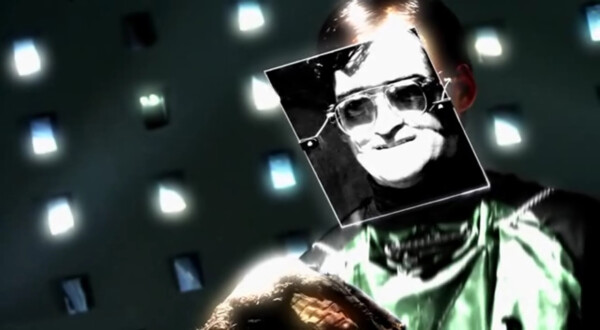
Image courtesy of Double Edge Films.
“Ink.” Starring Christopher Soren Kelly, Quinn Hunchar, Jessica Duffy, Jennifer Batter, and others. Directed by Jamin Winans. 107 minutes. Not rated. Amazon Prime
Mladen’s take
My boss recommended that I watch “Infinity Chamber.” I did and liked the film enough to see what other movies starred Christopher Soren Kelly, the computer hacker and insurrectionist in “Infinity Chamber.” The film “Ink” popped up. It was accompanied by an interesting summary, so I watched it. I did not regret my decision and Del better not either.
He and I take turns choosing which movies to review. While Del often picks losers, I seldom do. “Ink” is no exception to my sterling track record, but Del may disagree, albeit ineffectively.
“Ink” is a parable about right and wrong. The film tackles the notion of ambition and the way it can not only destroy those who are stepped on, but those who do the stepping. Trump should watch the movie. “Ink” explains in a Brothers Grimm sort of way why he’s so fucked now that he’s no longer occupying the White House. U.S. senators Tumbleweed Cruz, Rabid Rand, Lilting Lindsey, Himmler Hawley, and Murine McConnell, to name a few, would also benefit from watching the movie. In the end, “Ink” shows the way to redemption, which those boys will need badly before it comes time for them to meet their Maker.
Kelly plays two characters in “Ink,” terrible husband John, who’s even worse as a father, and Ink, a junior partner to the Grim Reaper. Toss in the supernatural kidnapping of John’s daughter Emma, portrayed very nicely by then-young Quinn Hunchar, by Ink; a group of fairy-like do-gooders trying to rescue Emma from Ink; and some very interesting others who side either with goodness or badness as this other earthly story unfolds, and you have a movie that reaches A-.
I was charmed by the film’s low-budget special effects, though using electrical tape to make X’s across the life rhythm keeper’s eyes annoyed me. It’s the life rhythm keeper, however, who is central to one of the film’s neatest pieces. He initiates an event that causes a chain reaction of incidents that result in John helping his daughter recover from her Ink-induced exposure to the dastardlier aspect of Dreamworld, the cabal of Incubi. The way the Incubi are depicted, by the way, is cool and psychedelic. It reminded me of the scenes in “Brazil” where the servants of the totalitarian state use information processing equipment fitted with magnifying glasses to read material used to destroy lives. Or were magnifying screens part of the setting of the movie version of “1984”?
It took me a moment to adapt to the way “Ink” works. But, I’m not particularly bright and Del less so. It may be easier for you to orient yourself. Be patient for the first, oh, 15 minutes of the film. By then you should be fully immersed in the realm the movie creates. Keep in mind that this movie must have had a small budget. It relies on drab urban landscapes, inner-city plots, and industrial workspaces to convey its fantastical world. I can’t recall the soundtrack, which is OK.
“Ink” is Aesop-like storytelling that serves as its own unadorned tool for teaching us all a lesson.
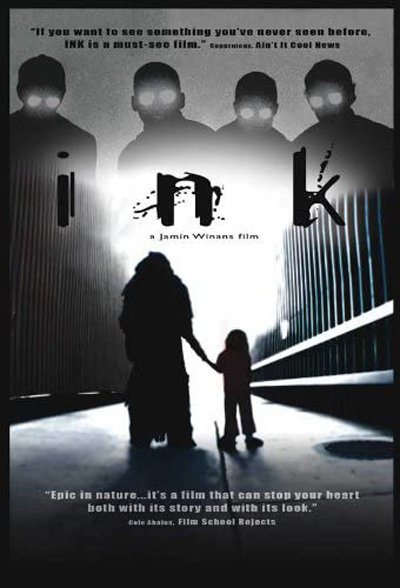
Del’s take
Oh yes, Mladen’s taste in movies is impeccable. He recommended “Bone Tomahawk” and I’m still in therapy. But with “Ink” he proved the old adage that if you give a monkey a typewriter, one day it’ll type Shakespeare. “Ink” is one of his rare winning suggestions.
I too was charmed by the movie, which is, as Mladen accidentally stumbled upon, a modern parable. And I agree that you need to give the movie a chance. Stick with it and you’ll be rewarded with explanations about Storytellers, Incubi and Pathfinders, all denizens of an alternate reality that rule supreme over your dreams.
“Ink” is one of those movies that requires attention, and yes, it operates on many different levels. But unlike “Tenet” it is not indecipherable. The keen eye will discern a very neat synchronicity bound in metaphors for good, evil, and more importantly, the loyalty and dedication borne of love.
The pacing is brisk but populated with moments of quiet introspection. But what impressed me most was the look of the film – gritty black and white and some very cool retro tech that reminded me of the John Wick films and Ridley Scott’s “Bladerunner.”
Hunchar is brilliant as Emma, the little girl whose soul is plucked from her body by the titular character Ink as he seeks entré to the world of the Incubi. Also brilliant is Jeremy Make as the blind Pathfinder Jacob (after falling – “Hello dirt. How are we today?”). Kelly is effective as the high-strung, hard-charging John / Ink, who spends the movie rediscovering his humanity.
Less impressive were the Storytellers, who seemed cut from the cloth of the ninja/warrior/apprentice template. They were there and they were honorable, and that was about it. Except Jessica Duffy as Liev, who sacrifices everything to save young Emma. Her character stepped out of the stereotype to make an impression.
“Ink” creates its own lexicon of morality and honor, and articulates those values in ways you likely have never seen. For an indie film it casts a long shadow, and I expect it will someday join the ranks of those quiet cult films beloved by fans of science fiction, horror and fantasy. You know the ones I’m talking about – “THX 1138,” “Code 46,” “Pumpkinhead” and “City of Ember,” all terrific little films nobody knows about but nonetheless advanced their genres.
I think “Ink” falls into the A- category. I don’t think it’s everyone’s cup of tea, but for those willing to do the work it’s a happy anecdote that will make that bottle of melatonin worth its weight in gold.
Mladen Rudman is a former journalist and technical writer. Del Stone Jr. is a former journalist and author.